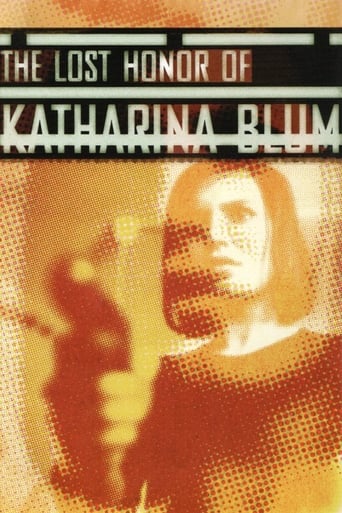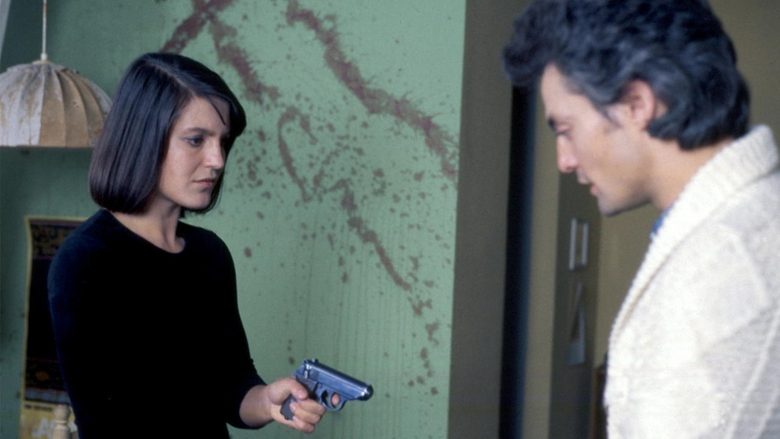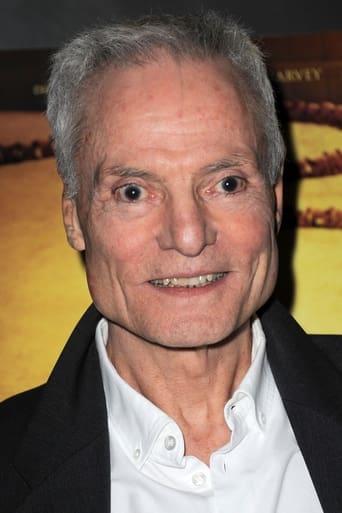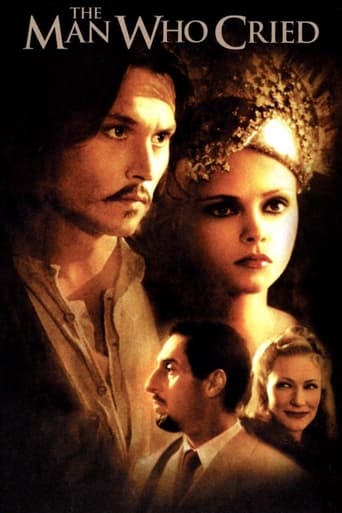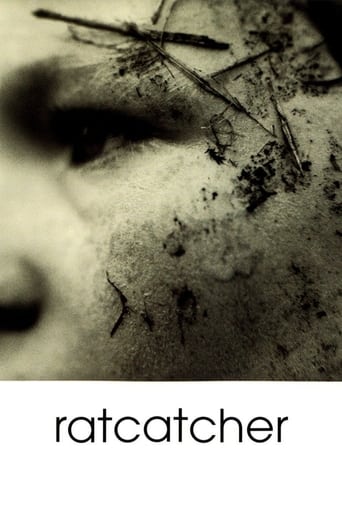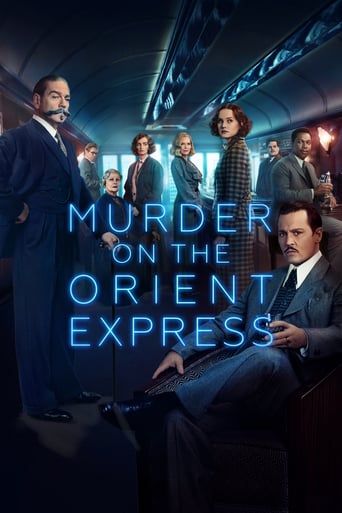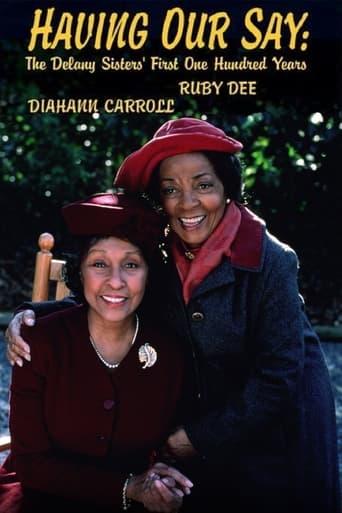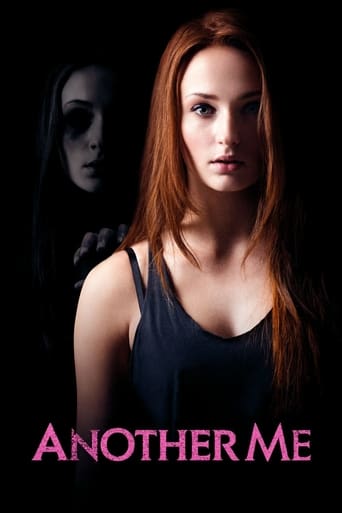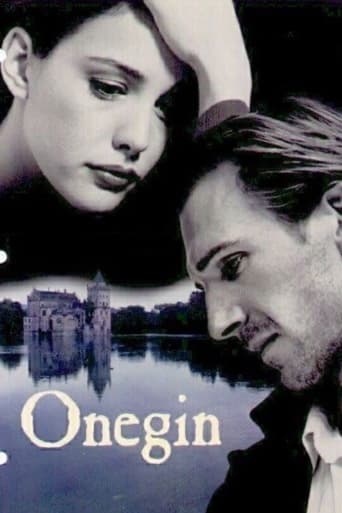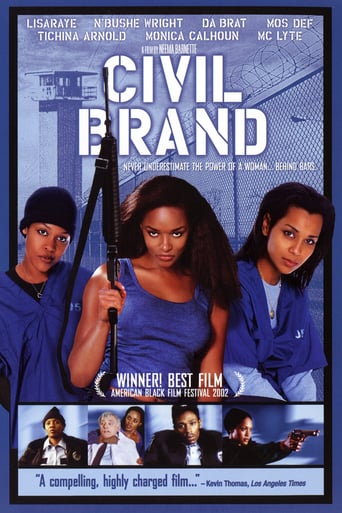The Lost Honor of Katharina Blum (1975)
After a chance encounter with a wanted man, a woman is harassed by the police and press until she takes violent action.
Watch Trailer
Cast


Similar titles
Reviews
Too much of everything
Pretty Good
The acting in this movie is really good.
A terrific literary drama and character piece that shows how the process of creating art can be seen differently by those doing it and those looking at it from the outside.
The film Die verlorene Ehre der Katharina Blum gives me an uneasy feeling, and this alone is of course a merit. On the other hand, during the film I had high hopes about the climax, and the actual ending became a disappointment. I still think that the director and the writer have missed an opportunity. Unfortunately it may well be that the silly unraveling is actually their intention. Most part of the film seems to be a warning to the viewer, that he or she can become a victim of the public opinion and the judicial system. Since this is both true and ill understood, the film could bring some enlightenment. In the Netherlands there used to be a PR campaign proclaiming that "the police is your best friend". In fact the interest of the police and the accidental bypasser are seldom coinciding, and paragraphs about extorted false confessions are not uncommon. And although the highly subjective gathering of news by the media is well known, most people still tend to believe what is in print or on the screen. The story is located in the turbulent Germany in 1975, at a time when violent revolutions still seemed a viable alternative. The anarchist Rote Armee Fraktion scored its first terrorist successes. The Berlin journals of Springer Verlag started a right-wing campaign, which had some resemblance to the American McCarthy years. Civil rights were curtailed, and radical citizens were excluded from certain professions. In this political climate the famous left-wing politician Rudi Dutschke was shot by an idiot. The film hitches on to these living conditions, when the main character Blum experiences love at first sight for a suspected and wanted "terrorist". Actually, the story is not quite clear about his criminal past, and it may consist of conscientions objection, verbal agitation or being member of a subversive organization or so. After a one night stand with the man (a quickie) Blum is arrested on suspicion of accessory. The man himself has somehow disappeared in a miraculous way. The police officer/interrogator is an unpleasant character, but to me his behavior seems to be within the usual limits. His main fault is a collaboration with an unscrupulous newspaper journalist. They exchange information, which is indeed penal and an official abuse, but I fear also quite common. The journalist even obtrudes himself on the dying mother of Blum, and writes a distorted paragraph about it. Characteristic is the reaction of the pertinent surgeon in response to the article: "If he indeed has entered the intensive care station, the hospital will sue him. However I think it is impossible". Consequently the public opinion condemns Blum as a terrorist, and she is spit at etc. So far so good. But then the story takes a bizarre turn. We discover that Blum has actually organized the escape of the "terrorist", and his going into hiding. Apparently she is indeed an accessory and guilty. In the end, she actually murders the journalist (and it is suggested also his photographer). The tables are turned: Blum is an unscrupulous criminal and the police officer and the journalist are effective professionals, albeit human, who deserve our admiration. The film ends with the burial scene of the journalist, where in a moving speech the liberty of the press and its vital importance for the democracy are professed. We are back with the fairy tale that the police is your best friend and the media tell the truth. In a world full of power abuse this is not the most helpful message, and therefore I can not frankly recommend this film. If you are captivated by the theme of state oppression in some form, you may consider seeing Fatherland, Man of Marble, Einer trage des anderen Last, or Die Architekten. In addition my list of reviews contains lots of films about unionism.
Volker Schlöndorff is either a diabolically brilliant dissembler, or a gifted idiot savant. His public persona of hapless twittering political correctness (see the extras on this DVD) comforts the intellectual and critical elite, while his terse well-crafted movies give the lie to the bloody nonsense those elites espouse. The Lost Honor of Katharina Blum (1975) is an excellent example of this. The official plot line of the film, mindlessly parroted here on IMDb and elsewhere, describes the young Mrs. Blum as an earnest innocent, a simple housemaid unwittingly caught up in the toils of the vicious capitalist news media and Germany's crypto-Nazi police bureaucracy. This summary neatly fits the pink-tinged world view of Criterion, creator of the DVD version. It does not fit the movie itself. If you actually watch the movie, rather than just read what you are supposed to think about it, you will realize about three- quarters of the way through, that although the police may be bumbling wretches, they were right all along about Mrs. Blum. She really is a cool and calculating agent of subversion, not just the passing plaything of a terrorist on the run. She is not cool enough, however. Her casual contempt for everyone around her -- for the lawyer and architect who employ and befriend her, for her shady financier lover, for her ex-husband, even for her own terrorist network -- is expressed in her sloppy tradecraft. She drops a damning clue which leads the police directly to her terrorist contact. Oh well, she shrugs, he was a loser anyway, just an army deserter. There are plenty more where he came from. The Lost Honor of Katharina Blum is not Volker Schlöndorff's best film -- The Legend of Rita (2000), The Ogre (1996), and Homo Faber (1991), are all better movies -- but it is not bad. *What IS bad is an insipid documentary on this Criterion DVD. It is a 1977 amateurish interview with Heinrich Böll (1917-1985), who wrote the 1974 novel which inspired Schlöndorff's movie. Heinrich Böll was a Wehrmacht soldier in the 1940s, turned Movement philosopher in the 1960s. In his stories and novels he shared with a younger generation, including director Schlöndorff, a profound wartime insight. On the battlefield, Böll had realized that the true enemy of Hitler's National Socialism had not been Stalin's International Socialism; he was old enough to remember the nineteen happy years 1922-1941 when the USSR and Germany had been allied against the West, until Hitler's jealousy had spoiled the grand Socialist coalition. No, what had ultimately defeated Heinrich Böll and his fellow German National Socialists in 1945 had been America and her twin evils, liberty and free enterprise. Two decades later, in the 1960s, America was on the way to defeating the International Socialists, too, starting in Viet Nam, unless the American military could somehow be stopped there. Böll was a leading orator of the West European branch of the worldwide "Youth Movement," organized from Moscow to resist the advance of America and liberty. "The Movement," as it self-consciously styled itself, did defeat America in the early 1970s - - not in Viet Nam, but in Washington -- leaving much of the world to languish under Communism for another decade and a half, and leaving tens of millions of Asian, African, and East European people to be butchered, their blood spilled on the altar of Marxism. (Leftists are strange people. Rather than bragging of their butchery, they primly deny it ever happened -- while planning the next round.)Heinrich Böll was a celebrated intellectual hero of The Movement, a "Freedom Fighter" who had fought against freedom all his life, fighting with pen and sword, with typewriter and assault rifle. Böll capped his career with the 1972 Nobel Prize in Literature, its gold medal outshining his by then tarnished Iron Cross. Böll died with Communist global dominion still seemingly on the rise -- expiring four years before the collapse of the Soviet Union, where his books had long been Party-subsidized bestsellers. Böll's no longer youthful Movement lives on today, metastasized throughout the West. Because Moscow is now in remission, for the moment, anyway, The Movement has allied itself with the Islamic Jihadists to struggle against their common enemies, America and liberty, private property and freedom, as well as against Israel and the Jews. Anti-Semitism is back in fashion among the intellectual elite. Perhaps it never left. So, if you buy or rent this DVD, enjoy the movie as it was actually made, not as it has been described. And unless you have either a strong stomach, or a weak mind, skip the hagiographic Heinrich Böll documentary.
Excellent film, well-worth searching out. According to the director's feature on the DVD,Boll wrote the novel after being smeared by a journalist who claimed Boll was a spiritual father to the terrorists, when in fact Boll was only trying to establish a dialogue with them.Excellennt acting throughout, with Jurgen Prochnow (Das Boot, English Patient) as the terrorist Ludgwig. And a true sign of a great film, it doesn't feel dated at all (other than the clothing- dig those crazy bell-bottoms!).I think some commentators are over-stating the obvious as far as civil liberties and left-wing/right-wing agendas. Governments always over-react that way. Our own Prime Minister Trudeau invoked the War Measures Act in the 1970s when the FLQ in Quebec kidnapped and killed a British diplomat. And Katherina herself is not totally without guilt, as she does aid and abet Ludwig. Also there is a scene with her in detention where she pulls a hankerchef out of her purse and what look like raw diamonds fall out onto her lap.I think the worst slime in the film is the print journalist, and the way the police collaborate with him, allowing him to get the "inside" first.The impressive funeral, complete with boy's choir, sponsored by the journal owner-manager, and his "spin" on freedom of the press show the propaganda war at work. Those in attendance include her "mystery lover", whose main concern is obviously protecting his reputation, understandably perhaps after seeing up close how the press destroyed Katherina's life.A great score by the German modernist composer Hans Werner Henze adds to the surreal Carnival atmosphere and environment.
The story takes place in West Germany in the 1970s, a time of great public fear caused by the Red Army Faction's terror campaign of bombing and murder. Katharina Blum is seen going home one night with a suspected terrorist after a party, and she is subsequently arrested and interrogated. The police give her some fairly aggressive treatment and the tabloid newspapers smear her name. As you would expect in a left-wing political film, Ms Blum plays the innocent martyr in all of this, an apparently wrongfully accused woman whose rights are abused by both police investigators and the media. The cops and reporters are made to be caricatures of meanness and evil. The film-makers try every manipulative trick in the book to make us sympathize with her, and think ill of her accusers. When she refuses to cooperate in their investigation, she is portrayed as legitimately defending her dignity. The problem with all of this of course is that to many politically moderate viewers, the woman thoroughly deserved everything that she got! [Some SPOILERS ahead] It is revealed at the end of the film that she did in fact aid and abet the terrorist, and in fact knew where he was hiding. She could easily have avoided all the negative newspaper coverage and police brusqueness by cooperating. Indeed she had a clear moral obligation to do so. That she felt a romantic attraction to the fugitive, is an incredibly selfish reason for her not to help the police. Only in the upside-down moral universe of the lunatic left does the anti-police and anti-media blame game in this film make any sense at all. Katharina Blum has only herself to blame for her loss of honor.

